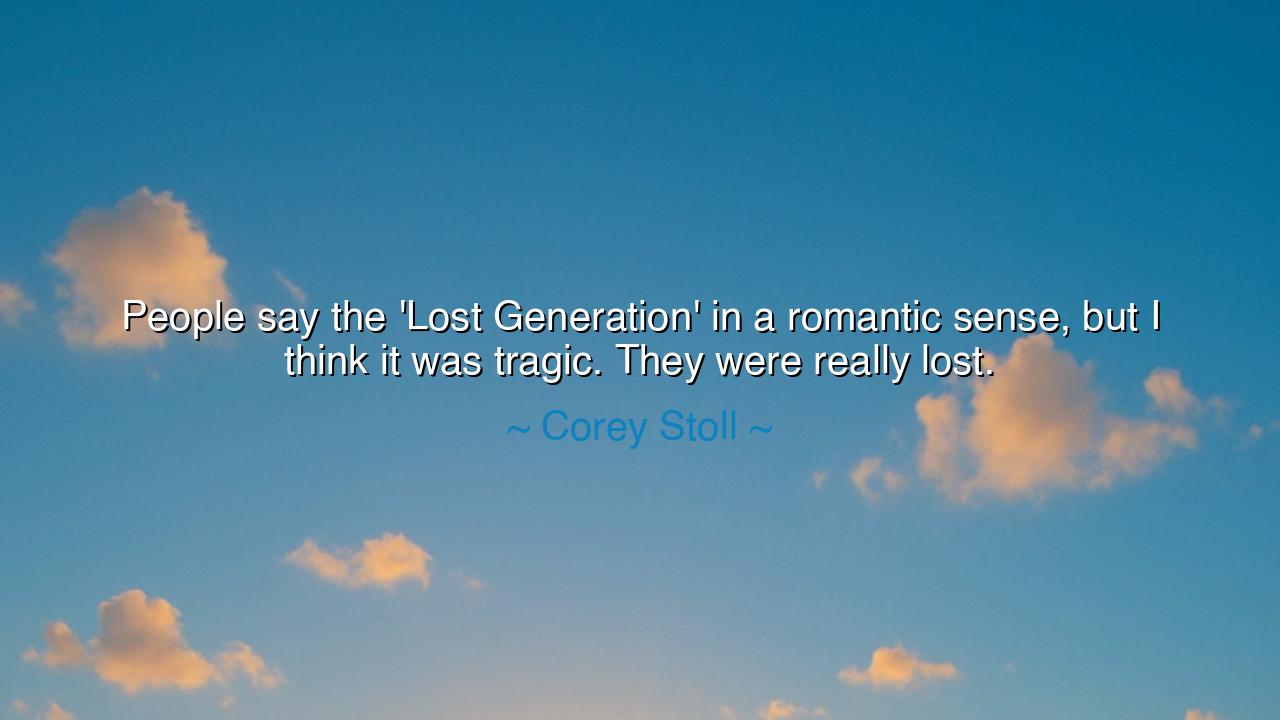
People say the 'Lost Generation' in a romantic sense, but I think
People say the 'Lost Generation' in a romantic sense, but I think it was tragic. They were really lost.






In the words of Corey Stoll, “People say the Lost Generation in a romantic sense, but I think it was tragic. They were really lost.” These words pierce through the veil of nostalgia and strike the truth of history: that behind the glow of art, literature, and legend, there once stood a generation whose spirits were torn asunder by the storms of their time. The Lost Generation was not merely a phrase of poetry; it was the reality of broken youth, wandering souls, and voices silenced by despair. To speak of them is not to indulge in romance, but to confront the wound of a people who sought light and yet often found only shadow.
The Lost Generation refers to those young men and women who came of age during the First World War, who witnessed blood and ruin on a scale the world had never known. They walked into battle with the fire of promise and returned—if they returned at all—bearing scars that no eye could see. Writers like Ernest Hemingway, F. Scott Fitzgerald, and Gertrude Stein gave us glimpses into their hollow triumphs and desperate revelries. But let it not be forgotten: the brilliance of their words often arose from the abyss of their suffering. They were truly lost, wandering in exile not just from nations, but from certainty, hope, and faith in the order of the world.
Consider the story of Wilfred Owen, a young poet-soldier of Britain. His verses burned with honesty, describing the gas, the trenches, the mangled bodies of comrades who fell by his side. He was but twenty-five when he was slain, one week before the armistice was declared. His lines, dripping with both beauty and horror, remain immortal: “The pity of war, the pity war distilled.” This is no romance—it is tragedy carved into the very marrow of civilization. Owen’s fate, like that of countless others, embodies the truth Corey Stoll reminds us of: to call them lost is not to adorn them with mystery, but to name their very condition.
And yet, in the centuries since, men and women have looked back upon the Lost Generation with a strange fondness, as though their disillusionment were glamorous, as though their wanderings in Paris cafés and smoky jazz halls were the essence of freedom. But such remembrance can be dangerous if it blinds us to their agony. For beneath the champagne and the wild music lay brokenness, an attempt to drown grief in excess, to silence nightmares with intoxication. Their laughter was often desperate, their art an attempt to stitch together what the war had torn apart. They were not adventurers in some romantic tale; they were seekers of healing who rarely found it.
The lesson, then, is clear: do not mistake suffering for beauty, nor glorify despair. To be lost is not noble, though it may yield art that touches eternity. What is noble is the quest to endure, to rebuild, to find one’s way through the wilderness. We must honor the Lost Generation not by romanticizing their wounds, but by remembering their warning—that when humanity allows destruction to consume its youth, it loses not just lives, but futures, dreams, and whole worlds of possibility.
And so, to you who hear these words: take them as guidance. When you see a soul wandering, adrift in grief or confusion, do not celebrate their suffering as if it were some mysterious charm. Instead, reach out with compassion, offer them direction, and remind them that being lost is not the end, but the beginning of a journey back to wholeness. Learn from history, so that the mistakes of the past do not steal the promise of tomorrow.
What should you do in your own life? Remember the value of purpose. Root yourself in work that brings meaning, surround yourself with bonds that uplift rather than unravel, and seek joy not in drowning pain, but in cultivating hope. Create art, yes—but let it rise from strength and vision, not only from despair. In this way, you honor those who were truly lost, by ensuring that you, and those who walk beside you, may be found.






AAdministratorAdministrator
Welcome, honored guests. Please leave a comment, we will respond soon